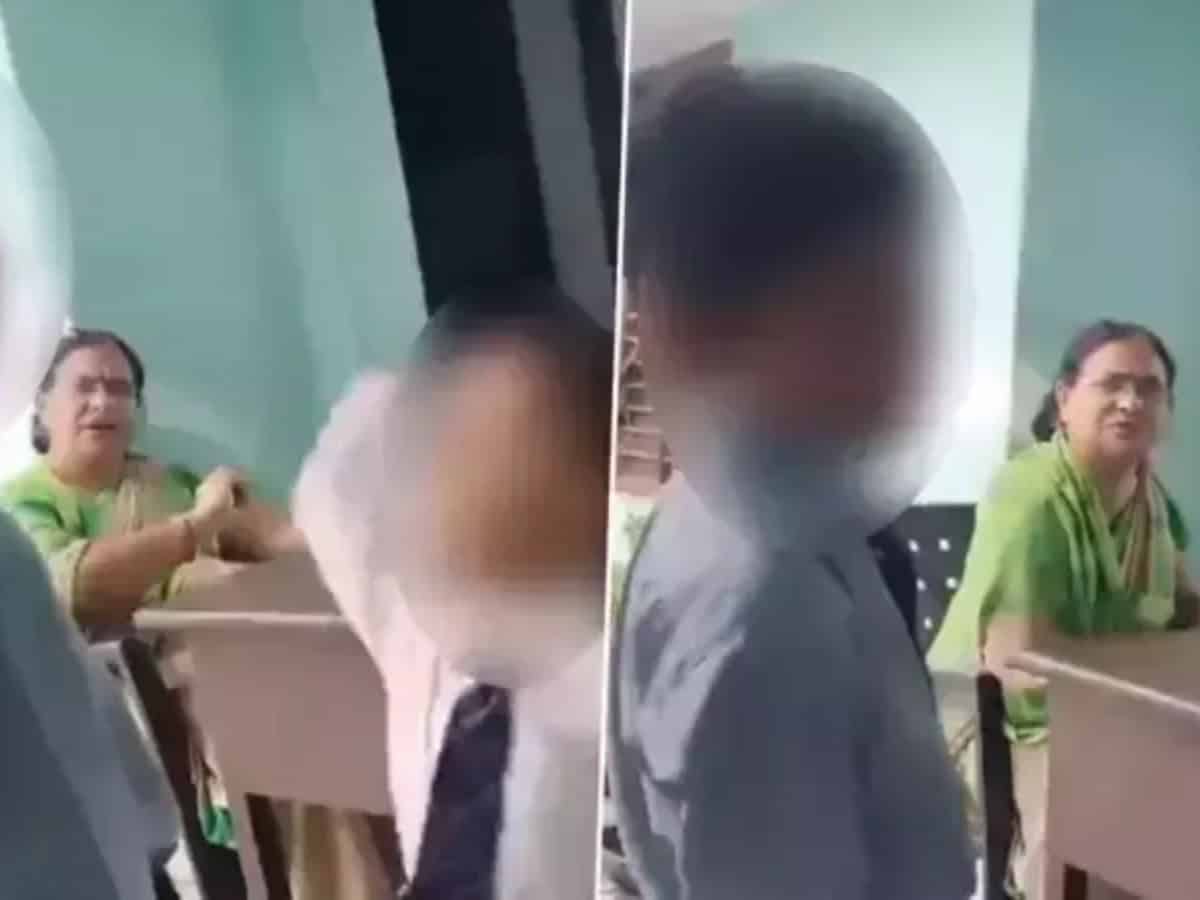
The Supreme Court of India reviewed the Muzaffarnagar student slapping case on Thursday, which sparked controversy over allegations of religious discrimination. The case centred on a disturbing incident in 2023 where a female teacher at a private school was captured on video encouraging students to slap a classmate, a seven-year-old Muslim boy, as punishment for not studying properly.
Court proceedings
A division bench of Justice Abhay Oka and Justice Augustine George Masih was hearing a PIL filed by activist Tushar Gandhi concerning the Muzaffarnagar student slapping case and the non-implementation of the Right to Education Act, 2009.
During the proceedings, Senior Advocate Shadan Farasat presented evidence to the Supreme Court regarding Rule 5 of the Uttar Pradesh Right to Education (RTE) Rules, 2011, which was enacted to protect children from religious discrimination in schools.
Advocate Farasat argued that despite the existence of the Act, authorities are failing to recognise and address the issue of protecting minority children from harassment or other forms of discrimination in educational institutions.
Advocate Farasat highlighted three key issues:
- Implementation of Section 12(1)(c) of the RTE Act: This mandates that each private unaided non-minority school reserve at least 25 per cent of entry-level seats for socio-economically disadvantaged students.
- Recognition of Religious Discrimination: Advocate Farasat insisted that authorities must first acknowledge the phenomenon of religious discrimination before taking legal action.
- Inadequate Chargesheet: Farasat alleged that the chargesheet lacks detailed provisions in terms of child cruelty as per the Juvenile Justice (Care and Protection of Children) Act.
Speaking during the hearing, Advocate Farasat also mentioned that the child’s father had not received a travel reimbursement of Rs 200 for each day the child attended school after July 2024. The child continues to attend school and performs well academically.
Court ruling
Justices Abhay Oka and Augustine George Masih expressed dissatisfaction with the Uttar Pradesh police investigation and instructed Additional Advocate General (AAG) Garima Prashad to file a report on the action taken in the case.
The Court also directed Advocate Prashad to appear on the next date and ensure the release of travel reimbursements to the child’s father before the next hearing.
“We are adjourning the matter till 12th December, to be listed at 3:00 p.m. There is an affidavit filed by the child’s father on 25th November 2024. He has made a grievance that since July 2024 he has not received travel reimbursement, which was paid earlier. We direct the learned AAG to take instructions in this regard and ensure that the payment is released,” the Court stated in its order as reported by Live Law.
Earlier, the Court noted prima facie evidence indicating that the state had failed to comply with provisions of the RTE Act regarding anti-religious or caste discrimination.
The Supreme Court of India reviewed the Muzaffarnagar student slapping case on Thursday, November 28, which sparked controversy over allegations of religious discrimination. The case centred on a disturbing incident in 2023 where a female teacher at a private school was captured on video encouraging students to slap a classmate, a seven-year-old Muslim boy, as punishment for not studying properly.
Court proceedings
A division bench of Justice Abhay Oka and Justice Augustine George Masih was hearing a PIL filed by activist Tushar Gandhi concerning the Muzaffarnagar student slapping case and the non-implementation of the Right to Education Act, 2009.
During the proceedings, Senior Advocate Shadan Farasat presented evidence to the Supreme Court regarding Rule 5 of the Uttar Pradesh Right to Education (RTE) Rules, 2011, which was enacted to protect children from religious discrimination in schools.
Advocate Farasat argued that despite the existence of the Act, authorities are failing to recognise and address the issue of protecting minority children from harassment or other forms of discrimination in educational institutions.
Advocate Farasat highlighted three key issues:
Implementation of Section 12(1)(c) of the RTE Act: This mandates that each private unaided non-minority school reserve at least 25 percent of entry-level seats for socio-economically disadvantaged students.
Recognition of Religious Discrimination: Advocate Farasat insisted that authorities must first acknowledge the phenomenon of religious discrimination before taking legal action.
Inadequate Chargesheet: Farasat alleged that the chargesheet lacks detailed provisions in terms of child cruelty as per the Juvenile Justice (Care and Protection of Children) Act.
Speaking during the hearing, Advocate Farasat also mentioned that the child’s father had not received a travel reimbursement of Rs 200 for each day the child attended school after July 2024. The child continues to attend school and performs well academically.
Court ruling
Justices Abhay Oka and Augustine George Masih expressed dissatisfaction with the Uttar Pradesh police investigation and instructed additional advocate general (AAG) Garima Prashad to file a report on the action taken in the case.
The Court also directed advocate Prashad to appear on the next date and ensure the release of travel reimbursements to the child’s father before the next hearing.
“We are adjourning the matter till December 12, to be listed at 3:00 p.m. There is an affidavit filed by the child’s father on November 25 2024. He has made a grievance that since July 2024 he has not received travel reimbursement, which was paid earlier. We direct the learned AAG to take instructions in this regard and ensure that the payment is released,” the Court stated in its order as reported by Live Law.
Earlier, the Court noted prima facie evidence indicating that the state had failed to comply with provisions of the RTE Act regarding anti-religious or caste discrimination.
On May 14, 2025, the Supreme Court ordered the UP government to bear all educational expenses for the Muslim student. Click here to read more.



